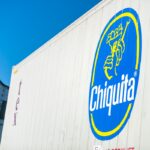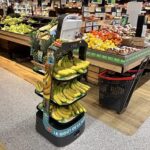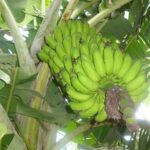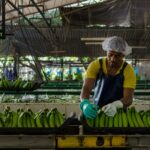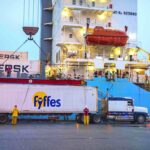Costa Rica: Banana industry works to stay free of Tropical Fusarium Race 4

In 2023, Costa Rica exported 127 million boxes of bananas, equivalent to US$1.2 billion, representing approximately 7% of the country's total exports, a third of agricultural exports and remaining the largest agrarian item.
The main destinations for Costa Rican bananas are the European Union (46.12%), the United States (32.25%) and the United Kingdom (9.35%).
The National Banana Corporation (CORBANA) research director, Rafael Segura, indicated that the main banana varieties produced in Costa Rica are Cavendish, Williams, and Valery.
Phytosanitary protection
FreshFruitPortal.com spoke with the general manager of the National Banana Corporation (CORBANA), Jorge Sauma Aguilar, who explained that "since we knew about the seriousness of Fusarium Raza 4 Tropical (Foc R4T), we conducted a global workshop, with the participation of leading researchers from around the world, to analyze the infestation of the soil fungus."
He said that in 2019 the fungus arrived in Colombia, two years later it was detected in Peru and then, in 2023, in Venezuela.
"Every two years it arrives in a new country, it is a bit curious. We have taken a series of protection and exclusion measures. The main measure is the spraying at the borders, measures in isolation farms, in addition to a protocol for entry into the fields," said Sauma.
CORBANA conducted a simulation in 2019 and recently in 2023. For his part, the general manager noted that "we have been in continuous communication with the International Organization for Animal and Plant Health, with the FAO World Banana Forum and with the Alliance for FocR4T, as we are members of the Executive Committee of all these organizations".
He added that "it is a very serious problem, so we are monitoring and looking for methods for early detection, which is the most important thing."
"We have partnerships with research entities and we have worked in forums on varieties that are resistant, with different methodologies. We have an agreement with EMBRAPA, an entity in Brazil, to develop resistant varieties by conventional methods," he added.
Fusarium and recommendations
Rafael Segura explained that they have made a national effort to keep Costa Rica free of Foc R4T. The main measure is to prevent the fungus from entering the plantations.
He detailed that they are applying a series of prevention initiatives at borders, for example, fumigation of vehicles and revision of shipments -preventing the entry of vegetative material- and control at airports. In addition, all imported banana material must be certified.
The researcher added that at the farm level, producers have opted to isolate their plantation, leaving only one entrance, where people disinfect their shoes. Some farms have their own shoes so that visitors can change them, "in this way, they avoid people entering with shoes that have been on other plantations. The farms also have their own tools and no tools leave the farm to avoid these risks".
Given the good results of prevention and protection against the presence of Fusarium Raza 4 Tropical in Costa Rica, the researcher gave some recommendations: "The most important thing is the issue of surveillance and early detection. In Costa Rica we are constantly working to maintain phytosanitary surveillance of high and low scale banana plantations."
CORBANA has activated a free telephone line where people who find plants with Fusarium-like symptoms can call and report them. "In these cases, samples are taken and sent to the laboratory to analyze by molecular methods whether it is real or not. To date all cases have been negative. While preventing, we work through research in production systems under infestation scenarios using Fusarium Raza 1 and the Gros Michel group type banana" he said.
He emphasized that the most important thing is to be constant in prevention, registering visitors, and avoiding escape areas where people can enter.
Similarly, he explained that they are using remote detection systems, particularly with spectral photographs, to define if any plant on the farm has a different color that may be related to a particular condition, either nutritional or phytosanitary point of view.
"We consider that so far we are excluded from Fusarium Race 4 but there is always room for improvement because the risk will never disappear. We always have to take all measures to exclude and prevent."
Banana challenges
With a more global look at the industry, CORBANA's research director commented that the sector faces other challenges, beyond the entry of Foc R4T "An important challenge has been climate change, as it has affected agricultural production and bananas have not escaped it, with very dry seasons and also very strong rainfall events, which can cause flooding".
Segura said that another challenge is related to market regulations and the decrease in the possibility of using conventional molecules to control diseases: "The issue of maximum permitted residues affects. We are close to the exit of some products from the management package and this could affect competitiveness, with respect to disease control and this could also affect the sector's productivity".
Omar Sánchez, assistant manager of the institution, emphasized that a major challenge that Latin American producing countries are facing together is a more equitable distribution of the banana value chain.
"We are already developing some efforts through FAO, where we have met with different actors in the chain, to seek that the concept of shared responsibility that is being developed at the level of the European Union, also reaches all links in the banana value chain or the banana producer receives a fair price".

















